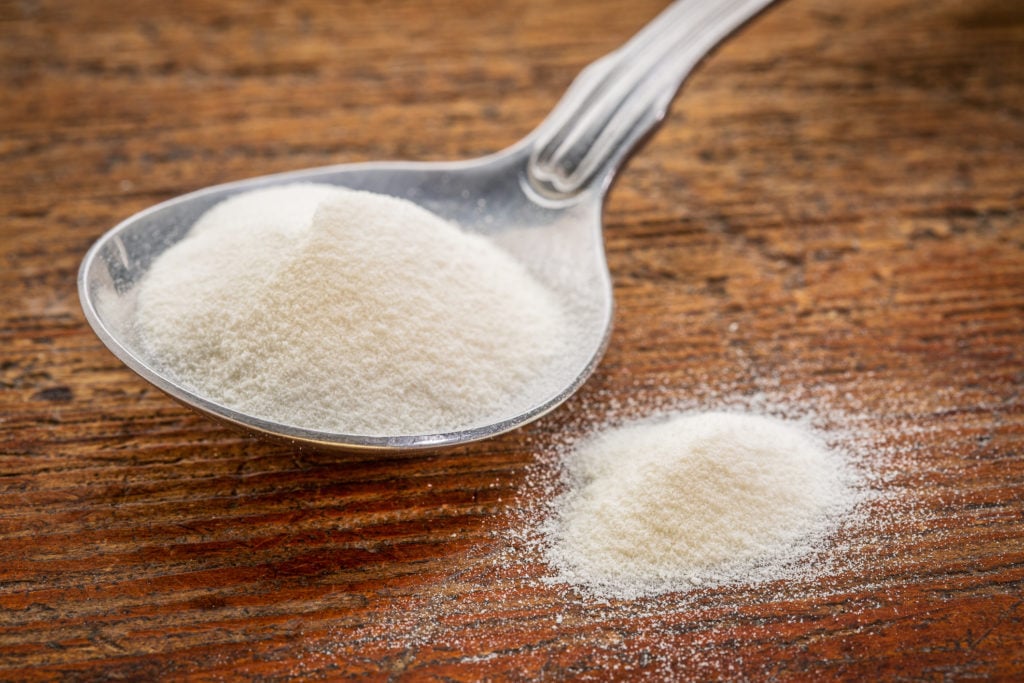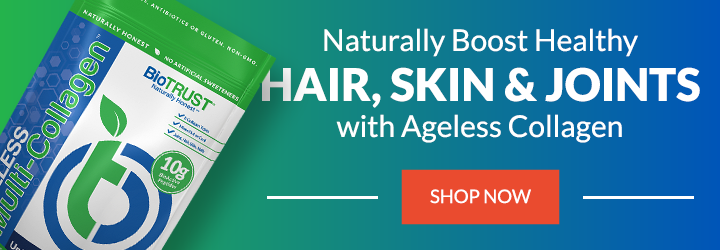What is Collagen and Should You Be Taking It?

By now, you’ve seen the ads and heard the buzz about collagen—it’s everywhere. But, it’s hard to jump on the bandwagon if you’re not sure what it is or where it’s going. I’m not going to lie, if you’re interested in supporting your skin, nails, gut, joints, bones, tendons, ligaments, muscles, and more, collagen really is all that it’s cracked up to be! But what is collagen? Why is it important? What is collagen protein made from? What does collagen do for your body? Can you replace lost collagen? How do you increase collagen? Which collagen is best? What are the health benefits of collagen protein? In this article, I’m going to give you the lowdown on collagen, including answers to all these questions and more!
Whether you’re determined, young, and ambitious…or you’re trying to overcome the frustration of a middle-aged body that’s seemingly turning against you…or you’re an active senior looking to get the most out of life, collagen protein may be your meal ticket to better fitness, shape, beauty, and aging gracefully.
What is Collagen?
Simply put, collagen is the most abundant and arguably the most important protein in the body. In fact, collagen constitutes a whopping 30% of the protein in your body, and that means, aside from water, collagen is the most abundant substance in your body—pretty crazy, right? 1,2
For example, collagen makes up 70% of the protein in our skin, and it’s one of the primary structural proteins in joints, bones, cartilage, ligaments, tendons, hair, fingernails, blood vessels, spinal discs, the intestinal wall, the blood-brain barrier, and more. Collagen is the glue—literally, it comes from the Greek word for glue (kólla)—that supports, connects, and holds everything together.
Along those lines, collagen is the protein that makes up the body’s fascia, a sheath of inseparable tissue that surrounds, penetrates, and connects all structures of the body from head to toe. Another super important property of collagen fibers is that they have enormous tensile strength. In other words, collagen is designed to be stretched without being broken.
Not surprisingly, maintaining healthy levels of collagen is vital to support many aspects of overall health, including:
- Smooth, healthy, younger-looking skin
- Strong, healthy fingernails and glossy hair
- Healthy, supple joints and strong, stable bones
- Healthy digestion and gut health
- Strong, healthy tendons and ligaments
There’s more—including healthy, flexible blood vessels and properly functioning organs—but the moral of the story is that collagen is a vital component of your entire body, and it has a tremendous impact on how you look and feel.
Is Collagen “The Fountain of Youth”
When you’re young, your body makes all the collagen it needs. That’s why your skin is firm and glowing, your joints are supple, your bones are strong, your digestive system worked like a champ, recovery from activity wasn’t even an afterthought, and in general, you looked and felt leaner and healthier.
Simply put, healthy levels and structure of collagen are signs of youth, radiance, vibrancy, and vitality.
So, what happens as you age?
Well, as we get older, collagen fragmentation increases—thanks to an increase in the activity of enzymes that break down collagen—and collagen synthesis decreases. In simple terms, we produce less collagen as we age.
For example, studies show that skin levels of collagen decrease by about 11 – 13% with each passing decade after the age of 20, and by the time we hit our 80s, we’ve got roughly one-third of the collagen we did when we were in our 20s. 3

Over time, this explains, at least in part, why…
- Skin sags and wrinkles
- Hair gets thinner, and nails lose their strength
- Joints become stiff and less flexible
- Recovery from activities like exercise slows
- New food intolerances pop up and digestion-related complaints come out of nowhere
- Our bodies seem to turn on us
Now, just because we tend to see an age-related decline in collagen production doesn’t mean it’s inevitable. You see, collagen depletion is at least partly lifestyle-related.
What Else Affects Collagen Levels?
Surely, you’ve seen folks who seem to violate the laws of what’s “supposed” to happen with age. They have healthy-looking skin, hair, nails, and teeth. They don’t have joint problems. They look great and maintain a physically-active lifestyle. They don’t complain of digestive-related issues. And they have strong healthy bones.
Are they just genetically gifted? Sure, that may be part of the story, but the bigger part of the story is that we can combat age-related consequences through a healthy lifestyle. You see, unhealthy habits like smoking, excess sun exposure, stress, disrupted circadian rhythms, changes in digestion and hormones, and a poor diet can all accelerate collagen breakdown. 4
For example, consuming high amounts of sugar and refined carbohydrates (like flour) leads to the formation of advanced glycation end products (called AGEs, for short), which accumulate in connective tissues where they accelerate collagen depletion. In fact, AGEs reduce collagen production and increase the activity of enzymes involved in collagen breakdown—a double whammy! 5
Not surprisingly, excess consumption of omega-6 fatty acids—thanks in large part to an abundance of refined, bleached, and deodorized vegetable oils, such as soybean, corn, canola, cottonseed, safflower, and sunflower oils—also increases the activity of enzymes responsible for breaking down collagen.
In other words, the typical Western-style diet and its heavy reliance on processed, packaged, fast “foods” that are fortified with poor-quality fats and refined carbohydrates is a surefire recipe to accelerate collagen depletion and the rate at which you look, feel, and act older.
Basically, getting older and lifestyle factors can both deplete and accelerate collagen production…sounds pretty darn grim, doesn’t it? Guess what? It’s not all bad news.
How Do You Increase Collagen?
The good news is that, no matter how many candles are on your birthday cake, there are steps you can take to support healthy levels of collagen. You see, if you want to combat the typical decline in collagen levels, you need to do two things: 1. Slow collagen breakdown; and 2. Ramp up collagen production.
Along those lines, the first step in combatting the typical decline in collagen levels is to clean up your diet and clean up your act. If you want to feel more like you did when you were younger, eat better, move your body in healthy ways, and dump the habits you know are unhealthy.
And now, here’s even better news: You can ramp up your body’s collagen production by consuming more collagen protein in your diet.
You may be thinking, “Isn’t protein just protein? Can’t I just eat more meat, fish, chicken, and eggs.” Not so fast. Let’s take a step back and peel back another layer to get a better understanding of just exactly what is collagen.
Collagen protein is very different from other common protein sources—such as beef, poultry, fish, eggs, dairy, and plants—because it features a unique profile of amino acids. In particular, it is especially rich in the conditionally essential amino acids glycine and proline, and it is the ONLY source of hydroxyproline. Together, these three amino acids account for 40 – 50% of the amino acids in collagen protein, and that is 10 – 20 times higher than other common protein sources.
Why is that important?
These are the raw materials the body needs to combat collagen breakdown and support healthy levels of collagen. Even more, research shows that consuming a very specific type of collagen protein—which I’ll get to in just a moment—trigger the body to make more collagen and produce more hyaluronic acid, which is a lubricating fluid that’s a key component of healthy, hydrated skin and strong, supple joints.
What Foods are High in Collagen?
Before getting to the top best sources of collagen protein, it’s important to point out that vitamin C is essential for the production of collagen. 6 Hence, a key step in supporting healthy collagen levels is to make sure you’re consuming plenty of vitamin C-rich foods, including:
- Citrus fruits like oranges and grapefruits
- Bell peppers
- Broccoli
- Brussels sprouts
- Cauliflower
- Strawberries
- Pineapple
- Kiwifruit
- Tomatoes
Okay, back to where you can find collagen protein…
Well, just like us, collagen is the primary structural protein in animals. You’ll find it in their connective tissue, including skin, bones, and cartilage. 7 Unfortunately, we’ve all but abandoned the traditional “nose to tail” way of eating.
Most people eat boneless, skinless muscle meat, which provides protein that’s vastly different than collagen. On the other hand, we rarely eat the bones, skin, hides, feet, hooves, scales, organs, and other connective tissue from land and sea creatures.
Of course, bone broth is a popular option. Considering it’s made by slowly cooking animal bones, skin, tendons, cartilage, and other connective tissues, it’s a great source of collagen protein. However, making homemade bone broth takes time to make and clean up—a lot of time.
Meanwhile, buying pre-made bone broth can become an expensive habit quite quickly, and let’s face it, most people aren’t interested in sipping a cup of bone broth every single day, which you’d need to do to continuously support healthy levels of collagen.
The Solution: Collagen Protein Powder
Fortunately, there’s a better, simpler solution that makes it even easier to get more collagen in your diet: You can use a collagen powder. Unfortunately, not all collagen protein powders are created equal.
For starters, most collagen powders (and bone broth, for that matter) come from a single source, such as chicken or cattle. This is important because different sources provide different types of collagen, each of which have different functions and benefits. While at least 28 different types of collagen have been identified, the three most common are types I, II, and III, which account for 80 – 90% of the collagen in the body. 2
Now, these various types of collagen are important because they serve different functions in the body. For example, collagen types I and III, which come from cattle and fish, are found in our skin, bones, and tendons. Type II collagen, which comes from chicken, is almost exclusively present in the cartilage between bones.
Types I and III (are like Batman and Robin) are often used for “beauty from within” benefits, such as promoting skin, hair, and nail health. Collagen Types I and III also support bone health. On the other hand, Type II collagen is the go-to option when it comes to supporting joint health.
I know all that Roman numeral soup may be confusing, but try not to get caught up in it. The point here is that if you want to support healthy levels of collagen throughout your body and reap the broad range of benefits, then you’ll want a collagen powder that contains multiple types of collagen from various sources.
While we’re calling attention to blemishes, it’s also worth mentioning some of the other drawbacks common among most collagen supplements, including bone broth and gelatin supplements:
- They are not broken down into smaller collagen peptides, also known as collagen hydrolysate or hydrolyzed collagen, which are bioactive collagen building blocks that are more easily and readily absorbed (than whole collagen protein). 8
- They are not complete proteins. Collagen protein is typically considered a “low-quality” protein because it is missing one of the essential amino acids (i.e., tryptophan), and that means those collagen supplements can’t be used to replace dietary protein. 9
- They taste and/or smell which limits how you can use them, and they can ruin the taste of whatever you mix them in.
- They don’t dissolve well in cold or room temperature liquids, often leaving a sticky, clumpy mess at the bottom of your glass that’s unpleasant to drink. And if it clumps, settles, and doesn’t mix well, that means you’re missing out on all that valuable nutrition.
So, Which Collagen is Best?
The best news of all is that when you can identify problems and shortcomings, you can create solutions. And the collagen powder solution is simple: It’s called BioTrust Ageless Multi-Collagen Protein.
Unlike bone broth, gelatin, and most collagen supplements, which typically contain one and sometimes two types of collagen (from a single source), Ageless Multi-Collagen Protein features FIVE collagen types (types I, II, III, V, and X) from FOUR premium sources:
- Hydrolyzed collagen peptides from grass-fed, pasture-raised cattle (types I and III)
- Hydrolyzed collagen peptides from sustainable fish (types I and III)
- A unique and patented eggshell membrane (types I, V, and X)
- Native, undenatured collagen from chicken (type II)
While collagen types I, II, and III are mission critical, type V (think Alfred in the Batman metaphor) works hand-in-hand with types I and III for optimal skin health, and type X is a rare type of collagen that is especially important for bone health. Altogether, we truly believe this unique combination of five types of collagen is particularly important to reap all the benefits collagen supplements offer.
Simply put, you need these five different types of collagen—in the scientifically correct proportions—to gain maximum benefit from collagen and experience powerful results, and that’s a big reason why Ageless Multi-Collagen powder is lightyears ahead of bone broth and so many other gelatin and collagen powders, which only provide one or two types at most.
Of course, Ageless Multi-Collagen protein is naturally hydrolyzed and features BioActive Collagen Peptides. This makes a monumental difference because they are absorbed intact and trigger the body to make more collagen. 10 Not only that, collagen peptides stimulate the body’s production of hyaluronic acid, which is a lubricating fluid that’s a key component of healthy, hydrated skin and strong, supple joints.
Recent scientific research has revealed several exciting health benefits of supplementation with collagen peptides, which have been shown to support:
- Healthy, firm, young-looking skin 11,12
- Strong, healthy fingernails 13
- Healthy, mobile joints 14,15
- Strong, healthy bones 16
- Healthy, strong tendons and ligaments 17
- Healthy appetite management 18,19
- Help build muscle and strength and reduce body fat 20
- Gut health
As an added bonus, Ageless Multi-Collagen Protein also contains all the essential amino acids you need—including a naturally fermented form of tryptophan, which is typically missing from collagen protein. In other words, Ageless Multi-Collagen Protein powder is a “complete” protein, which is important to help your body look and feel its best.
Ageless Multi-Collagen Protein is also completely odorless and tasteless, and it dissolves quickly and easily in both hot and cool liquids. That’s right, Ageless Multi-Collagen Protein is your no-clump and no-taste collagen powder solution! You can add ito your coffee, tea, protein shakes, smoothies, baked goods, and more without a nasty smell or taste, and without the clumps. You won’t even notice the difference, but your skin, hair, muscles, and joints will thank you.
What’s more, Ageless Multi-Collagen Protein is keto- and paleo-friendly, and because we are passionate about better health, we promise Ageless Multi-Collagen powder is:
- Dairy-free
- Cruelty-free
- GMO-free
- Gluten-free
- Hormone-free
- Antibiotic-free
- Free from artificial sweeteners, flavors, and colors
So, if you’re looking for the best collagen powder to help support healthy levels of collagen—and all the health benefits that go along with it—then we think you’ll find Ageless Multi-Collagen is your solution!






